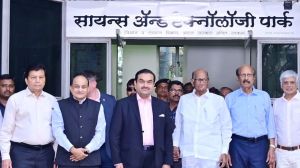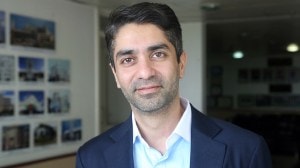Charming the media
Jaswant Singh's performance before foreign correspondents on Monday should provoke the question: why was this media savvy not in evidence im...

Jaswant Singh8217;s performance before foreign correspondents on Monday should provoke the question: why was this media savvy not in evidence immediately after the nuclear tests? If it had come earlier this country would have had a better chance of convincing a disapproving world that it had a legitimate point of view, and to put it across.
That many still do not know it is precisely because it did not seize quickly enough the moment to project it when India was top of the mind worldwide. Like it or not, in this age of the media marketing a decision through it is as important as the decision itself, if it is to have much chance of appreciation or at least understanding.
For that to happen, a clinical focus on getting the message across is essential. It follows that the people chosen to do so should be up to the task. What India does not need at this juncture is a Morarji Desai to intimidate the questioner or a Pramod Mahajan to smirk triumphantly. The idea is not to score debating points through stridency butto reach out to capture the attention of a world audience which normally has no more than a passing interest in this country. Nor is it for the government to make a decision for valid reasons but then to lose its tongue, or go ballistic in speech, when it comes to explaining to the world just what it is up to and why.
Two outstanding instances of the possibilities of smart media management for a country turning a situation to its own advantage come to mind. One was the remarkable feat of manipulation of the American media by Iraq8217;s ambassador in Washington after the Iraqi navy shot an Exocet missile into a US frigate.
At a time when Iraq was still a friend and Iran the evil empire, Iraqi Ambassador Nizaer Hamdoon systematically worked on the American media, most visibly on Ted Koppel8217;s Nightline, to convince America that the situation had been forced by Iran. Sure enough, American sanctions against Iran followed! Hamdoon later even took public credit.
The other was Saddam Hussein8217;s attempts atprovoking Israel to retaliate during the Gulf War by raining Scud missiles on it. His motive of course was to paint his aggression on Kuwait as a war against the common Arab enemy and so neutralise the opposition of Arab countries. Ergo, in the face of grave provocation, Israel was persuaded not to retaliate by the American administration, acutely sensitive to the media8217;s power. It was deeply anxious not to let Saddam8217;s aggression become distorted into an Arab coalition against Israel, helped along by the media.
The bottom line is that the media is at least as much about entertainment as about information, and this is even more true of television where attention spans are shorter and the need for liveliness and brevity correspondingly greater.
It makes it clear why those who have better soundbites and a clear message, look better under the camera and are more articulate will receive more exposure on the medium than those who have no idea of how to exploit it. The government did not use the internationalmedia smartly enough at the outset to explain India8217;s decision to go openly nuclear. But putting Jaswant Singh behind the mike is reason to hope that it now knows what to do.
- 01
- 02
- 03
- 04
- 05































